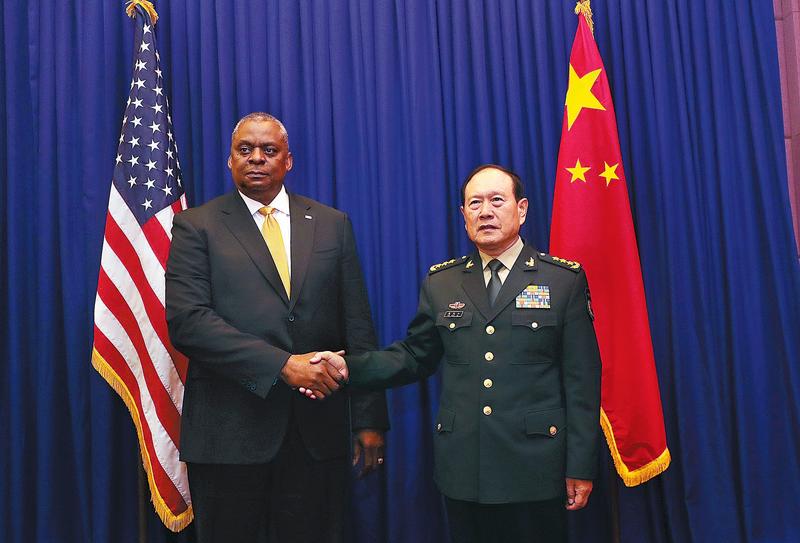In face of major challenges, community of shared future is right direction, Wei tells countries
 Chinese State Councilor and Defense Minister General Wei Fenghe (right) meets with US Defense Secretary Lloyd Austin in Cambodia on Nov 22. (LI XIAOWEI / FOR CHINA DAILY)
Chinese State Councilor and Defense Minister General Wei Fenghe (right) meets with US Defense Secretary Lloyd Austin in Cambodia on Nov 22. (LI XIAOWEI / FOR CHINA DAILY)
State Councilor and Defense Minister General Wei Fenghe called on Nov 23 for world solidarity and fairness instead of division and hegemony, as he told his counterparts from Southeast Asia and Asia-Pacific countries that world peace is facing major challenges.
Wei made the remarks in his speech at the 9th ASEAN Defense Ministers’ Meeting Plus held in Cambodia, which brought together defense ministers from the Association of Southeast Asian Nations and its dialogue partners Australia, China, India, Japan, New Zealand, the Republic of Korea, Russia and the United States.
In the face of major challenges to world peace and development, the right direction to take is to build a community with a shared future for mankind, which is also where the world’s future lies, Wei said.
He urged all countries to be united rather than divided, fair rather than hegemonistic, open rather than closed, and mutually beneficial rather than selfish, so as to jointly shape and maintain a regional order that balances the concerns of all parties and serves their interests.
Wei also said the Chinese military is willing to work with the militaries of other countries to continue contributing to world peace.
China does not covet the interests of other countries, but its resolve to defend its own interests is as firm as a rock, the general stressed, reiterating China’s position on the Taiwan question.
He said Taiwan is part of China and resolving the Taiwan question is a matter for the Chinese, adding that the Chinese military is unyielding, assured, confident and able to defeat any intruders.
Wei pointed out that the security situation in the Asia-Pacific region remains stable, but there are certain concerns. He told the conference that the defense departments of all countries should uphold the central role of ASEAN, follow the Global Security Initiative, focus on practical cooperation and work together to build a solid barrier for universal security.
On the sidelines of the ADMM-Plus, Wei met with defense ministers or representatives of the United States, Vietnam, Laos, Australia, New Zealand, the Republic of Korea and Russia, and discussed strengthening bilateral military cooperation and issues of common concern, said the Defense Ministry.
The United States must respect China’s core interests, with the Taiwan question at the very core, Wei told his US counterpart Lloyd Austin in their meeting in Cambodia on Nov 22.
Both sides agreed at their meeting to maintain communication and further enhance crisis management, which China’s Defense Ministry said helped enhance mutual understanding and avoid miscalculation.
General Wei said the responsibility for the current state of China-US relations lies not with China but with the US side, which has erred in its strategic appraisal, noting that China values the relations of the two countries and militaries, but the US must respect China’s core interests, according to the news release by the Ministry of National Defense.
US President Joe Biden, in his meeting with President Xi Jinping in Indonesia on Nov 14, said the US does not support “Taiwan independence”, “two Chinas” or “one China, one Taiwan”, and it has no intention of having a conflict with China.
Wei urged the US side to keep its word and honor its commitment, truly implement the consensuses reached by the two presidents, and adopt a rational and pragmatic China policy, so as to remove causes of crisis.
Liu Lin, a researcher at the People’s Liberation Army Academy of Military Science, said the security concerns in the Asia-Pacific region that Wei mentioned mostly result from the US, which has been increasing its presence in Southeast Asia in recent years to compete with China.
“The US has been attempting to, what it calls, ‘shape the strategic environment’ around China by building security frameworks in Southeast Asia and the Asia-Pacific,” Liu said, pointing to the AUKUS alliance with the United Kingdom and Australia, and the Quadrilateral Security Dialogue, which involves three Asia-Pacific countries — Australia, Japan and India.
That has increased security uncertainty in the region, which is why Wei highlighted the unity of all countries and called for upholding the central role of ASEAN in his speech, Liu said.
“China values the role of ASEAN much more, which has an independent and self-determined diplomacy,” she said. “The regional bloc emphasizes a balance between China and the US, benefiting China-ASEAN defense cooperation a lot and bringing huge potential and space for it.”
During the Wei-Austin talks, the two sides agreed that their militaries should earnestly implement the important consensuses reached by the two presidents, maintain engagement and communication, strengthen crisis management and control, and strive to maintain regional security and stability.
The two defense chiefs also exchanged views on international and regional situations, including the Ukraine crisis and the South China Sea and Korean Peninsula issues.


